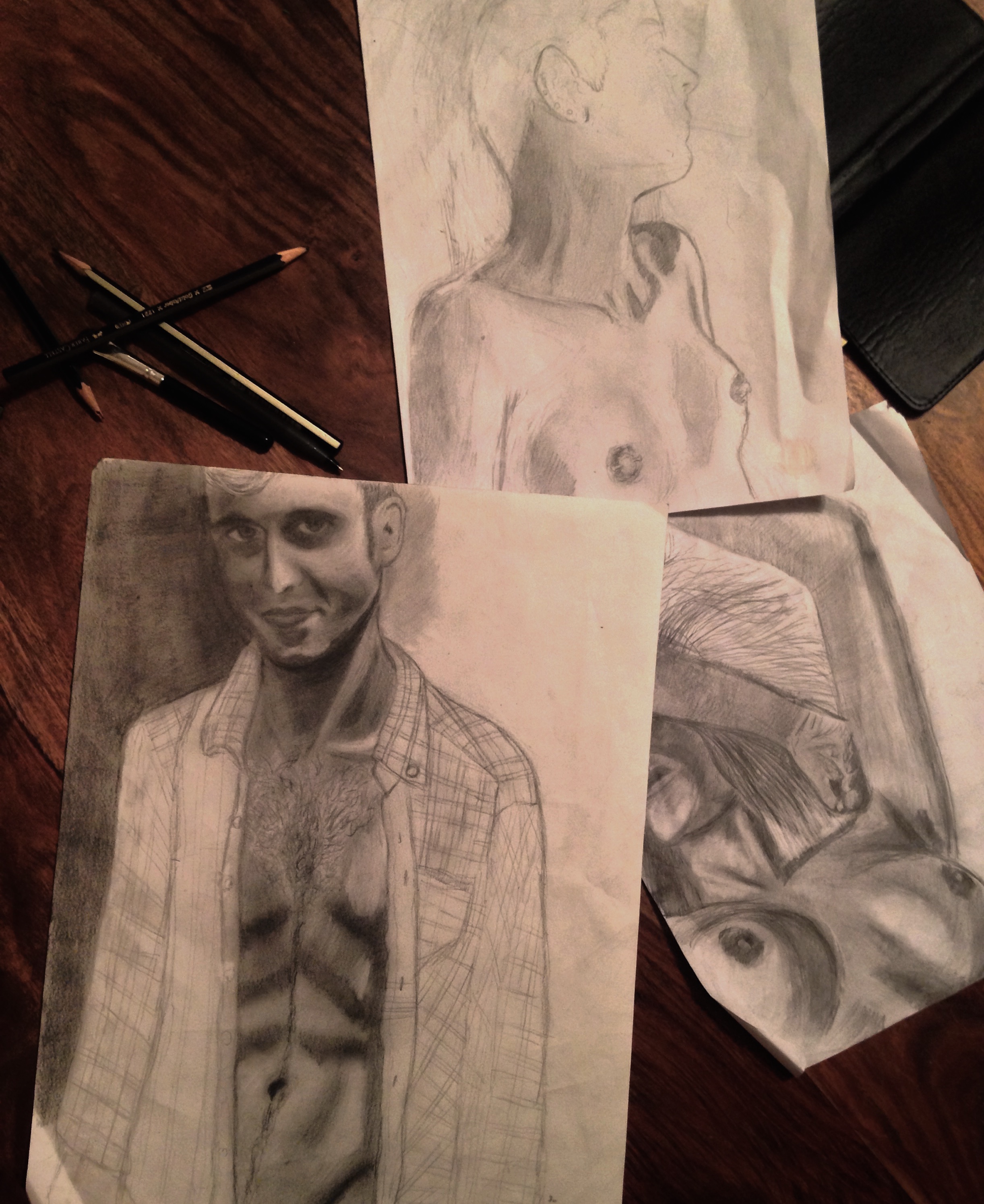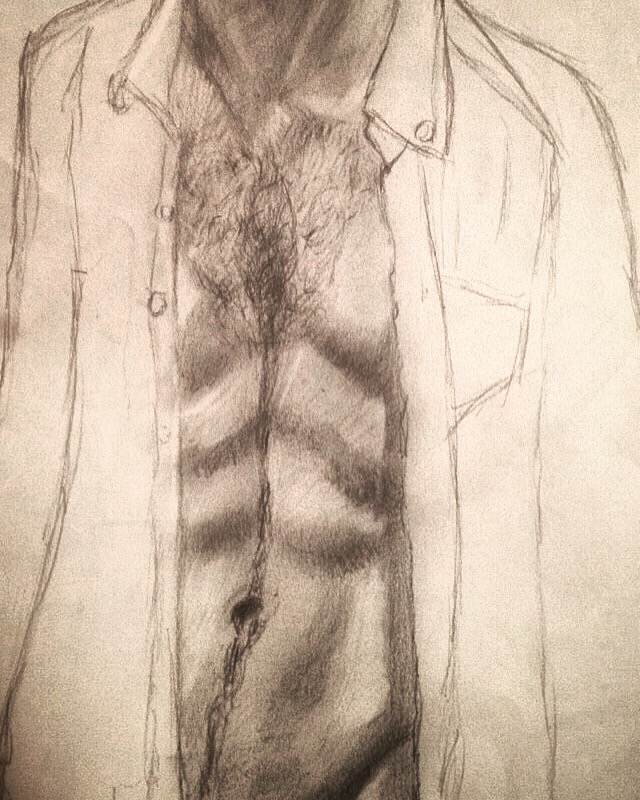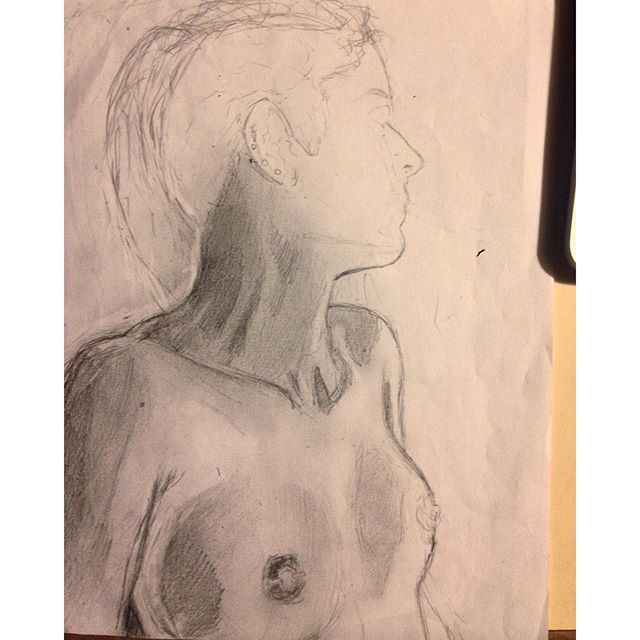It is the difference between planetary light and the combustion of stars.
E.B. White, The Ring of Time
Frigid currents of ink move in and around me: I lie still. Back arched, skin shivering pale, my eyes trace breathless patterns across a ceiling of mirrors. Some nights are easier than others. In shades of masochism, I disallow pleasure: I am not in pain, not exactly, but nearing it. My mind, like my body, resists its own desires—it is the final refuge of a form that has been wounded over and over again.
I wish that I had been found some years ago, before my soul was all scar tissue and rust: the debris of celestial bodies long past their time. How low and sorrowful, that one should only ever know the fading fires of their glory and their lust. How fragile and peculiar, that anyone could care for a thing so lost.
But then I feel my own self move: the skin and warmth, the vulnerability and vanity. Trauma bleeds out and away from whatever I am, as silver idioms fall from my mouth like fragments of the moon. In the amber haze of my own endurance, gentle hands revive the parts of me that have not yet been mutilated beyond repair: the mournful bones that murmur with sensation, the folds of skin still dusted with fading starlight. I awake bearing bruises that span this form like constellations, whispering nebulous patterns across my skin. The pleasure is so simple, so profound: to allow someone to love this tainted frame, to feel affection on its surface even when I cannot respond in full, is beautiful in its own right. Withdrawn and wretched though I may have become, my flesh remains a sanctuary upon which tenderness is still possible.
Enticed by the presence of each new fascination, I have lived these weeks within the subtle variations of music changing key. This is not a cosmic shift in circumstance, not the onset of a lasting passion, not the tremendous recalibration that accompanies a catastrophe or a muse. It is, in fact, almost poignant in its subtlety. I am affected, intrigued, even burning softly—but this will not destroy me. And how futile, how tedious that can feel.
But is it possible, perhaps, that I am healing? That maybe this is a different way of feeling and creating, dissociated entirely from the madness of the one who nearly drove me from my mind? The pain of that ending was damning, even for me: we were wasting my final cigarette on a poorly lit street corner when, without warning or provocation, my memory engaged at last with the full ramifications of my spent time. I watched the dispersion of ash across his fingernails, and desired suddenly to shake him, to scream, Meet my eyes. Say my name. There’s nothing! You’re empty, you’re empty—
And how was he to have appeased me, being so directionless, so undone? The answer emerges in its own futility: I never wanted to be appeased. I wanted to thrill him, to hurt him, to make him feel anything at all. When we made love, I wanted to tear him apart and work my way inside of him, to wrest something of value from that wasted mind. I wanted to undo each vertebral ridge, lace my fingers through the notches in his spine; I wanted to pull the lovely skin away and expose a labyrinth of bone. I wanted to dissemble him, that poor desperate thing, and breathe some sort of life into whatever remained. I wanted to punish and save him: I wanted to play God. Perhaps I would rather know my own value than ever love like that again.
But then, maybe that is not the whole truth of it. Maybe it was simpler and less cruel. Maybe I really did recognize something of myself in that gentle, disarrayed countenance. Maybe I just wanted to love something—to love anything at all.
When he passes I still feel him, still smell him; my entire body still reacts. He floods me like an opportunity wasted, but this time I am not at fault. I cannot love something half-alive; even at my strongest, I never could have. My mind reacts against that peril, recoils from the decisions that my mother made before me. I have to be better, and stronger, and closer to blameless—and if such severance mandates apathy, then may I never feel again.
But in the margins of my lucidity, his image haunts me still. Not even a week ago, I was reminded of this, as I lay in the arms of the woman who had shared my bed through the night. It was my waking mind that dreamt of him, and that was the most frightening of all. But it was dreaming all the same, and no less for my sentient state; I was conscious but not present, if you understand. And he was walking down empty streets drenched in rain and silence, his hands in his pockets, younger and stronger and unmarred by circumstance. I knew at once that he must have died to have been rendered so perfect, so complete. There was nothing left to be done, so we simply spoke on: and there were no secrets to draw back from, no deficiency in either of our minds. I felt no pain and his eyes seemed like the morning to me once more.
But fortitude is an exercise in self-denial. So I left the sleeping girl where she lay, her dark hair strewn about her shoulders, her raised scars gleaming faintly in the half-light. Kneeling beside the cluttered bedroom table, I cast myself again into that cold, clean high to which I have become so partial: the lucid currents that flood my veins like shards of glass and crystal, setting my teeth on edge, making me wish to set my past on fire and walk away without a word. But a history such as mine does not burn easily; it burns like flesh, and festers. With each new, self-inflicted horror, I remember that it never really fades.
Eight months ago, in late summer, the dawn sky was flooded with a gradient of muted tones. I was sharing cheap vodka, stale cigarettes, and half-remembered confessions with a young man I had met only hours previously. In the haze of that soon-to-be morning, I knew him as well as I have ever known another living being. I cannot recall what fear or desire I must have expressed, in the midst of those shared ruminations, but a response fell from his mouth with such simple conviction that I will remember each word for the rest of my life—
“You can’t seem to be anything other than what you are—you’re so you—and it’s funny, and it’s admirable, and it’s sad, and people are going to put you on a stage because they won’t know what else to do with you. And you’re going to have to be strong because of that.”
In the half-year that followed, I hardly knew what to make of so strange an assertion. After all, my own desires had always been so simple: to write, to speak, to not hurt. But when people mistake survival for performance, they judge it as such—that is only to be expected. And childhood was wasted on me, even before it went so wrong: I was always melancholic, always peculiar. People noticed, though I wish to God they never had. They made me feel different. I never wanted to feel different.
I want to be clear—I am not trying to martyr myself. My methods of endurance are flawed, to say the very least, and I am far from inculpable. But I am not performing. I never have been. I tried to be better, exhausted my sanity on efforts towards the normalcy that I was sure would bring acceptance. And for my part, I found it degrading. How could I even begin to forget what I am? Who would ever let me?
I have loved recklessly. I have bled with deliberation. I have felt my entire form buckle below the weight of the memories I cannot keep at bay. I have lied and grown listless: I have tried to die time and time again. Shall I go on—recall the hands on the back of my neck, the profane helplessness of my shame? Whatever this mind has done to me, whatever it is doing, it provided solace when nothing else would. Were I anything other than what I am, then I would be nothing at all. So I will not suffer to be made a spectacle of, will not look on as my survival is cheapened to a dirty joke. I imagine that even the most cynical among you can forgive me for that.
In the early months of winter, I wished to know what it felt like to heal. I sought a long-awaited beginning, and of course I did not find that: I never really expected to. But in the tranquility of a certain sunlit room, I found something close, and it was more than I could have hoped for. I loved this time so effortlessly and entirely: it was sweet, and it was clairvoyant, and it should not have ended so soon. Truly, I did not want it to. I still do not want it to. I wish I could have stayed just a little while longer in the sanctuary of those four walls, where I was desired and unafraid.
But there is no place for me there anymore, because the waking world intervened. It turned that sanctuary into just another facet of my perverse effort towards self-portraiture, condemned to fade with the chemical tinges of winter. I thought that I could trust the pleasure I derived, when the night fell softly and we moved into it as one, but now even the gentlest of these engagements recall nightmares of my abandonment. No two living beings can exist indefinitely, together and untouched; and so once again, I am watching something die, something that I cared for, and I am powerless to save it.
I cannot sustain tender, or gentle, or vulnerable things. I am too violent, too defective. I burn with spectacular precision, but I cannot live simply or decently. I am not getting older: just growing weary of watching the same cycles take newer forms. The sheer repetition, elation followed by despondency, hardly hurts at all anymore. I know that something left my life, but I do not understand when or why. So maybe I truly am deficient, maybe I always was. I am passionate but infertile, and when things fall apart, I cannot stop them. In fact, I often wonder if I deconstruct them myself. And what does it matter anyways, this time around? This is not new to me: it will never be new to anyone whose countenance is desirable only in its abstraction. Fissures appear, the glamour fades. I have lost beautiful things before now, and I will lose this too.
I am everyone and no one, always running, always remembering, always trying so hard not to want to die anymore. I have to keep moving: I cannot ever stop. My Tiresian soul carves patterns in the fabric of the world, shapes the currents of negative space wherein my consciousness sears with its own differentiation. Vanity, self-loathing, and fascination imbue all of the people that I am or have been—the withdrawn woman with shorn hair and faraway eyes, retreating always towards an empty doorframe; the reverential lover of those bright and shining forms, wielding elation like a knife’s edge and leaving her image in their skin; the jaded user who medicates each memory, drowning her indifferent soul in chemical tides; the restless adolescent with open wounds and a mind like a broken mirror; the cynical young man smoking cigarettes on London streets; the debased artist closer to laughter than confession; the radical dreaming of a different world; the lost little girl who still cannot quite understand where her father has gone, or why.
I have spent so much of my own existence wistfully mimicking tenderness, affection, vulnerability, gratitude. I socially perform paradigms of loving when I am often too tired to feel anything at all. And yet, I am not fully spent, because there have always been those who will not lose or leave me. They keep me here when nothing can; they call me by name when I fall beyond language, and so call me back to myself. When I am withdrawn or withdrawing, they lie patiently by my side, trusting me to resurrect myself again and again, knowing that I am doing everything that I can to make my way back to them. Perhaps this is one of those times; perhaps I have merely wandered too far from those who know me, in the mists of my somnambulist state. But I am awake now, I can feel it—and I will find them again. I will find them.
My desperation ebbs like a pulse. I used to be so much stronger, but I am tired now: I am tired, I am tired, and I wish to feel nothing at all. All I want anymore is to love, to be loved, to engage. I want to be like a child again, immersed in that sense of abandon that I only achieve when that thing that lies dead or dying in my mind is rekindled, and breathes inside of me. I want to believe that I can care and be cared for, that I am known and valued, that I do not have to be afraid. I harbor an unspoken desire to be unnoticed and overlooked: to harm no one and eventually fade away. It is the yearning of the child I was never allowed to be: to keep so quiet that no one can never find me. But my nostalgia is futile, and I mourn for a past that is not mine. I am growing so weary of solitude and self-protection. I am ready to feel some other way.
My mind is tangled in bloodstains and bed sheets: in the refuge of a nameless language and the longings of a body altered long past recognition. Even after all of these years, there are parts of me that are not getting better. This is not a meditation: it is a confessional verse. Whatever I may write or say, always remember that people like me were never meant to survive.
So what in the world does it mean for us when we do?
I knew a girl in childhood who, when I was still young enough to believe in my father, was already infected with the history of this world. In the final conversation we shared, as we lay in the afternoon light, our silence was flooded with formless expression: the ever-present thoughts to which we never gave a name.
I am with you. I love you. More than my life, and always, always—
Her head fell sighing back upon the white fabric, among the drops of blood that framed her mouth like garnets, beautiful and clean. Gazing at me, one unclenched hand resting by her face, she placed her wrist beneath my fingertips, and let her eyelids fall. Then I could feel everything she was, running like memory through those ephemeral veins, and I knew the last dream of my childhood: to never love again.

















Recent Comments